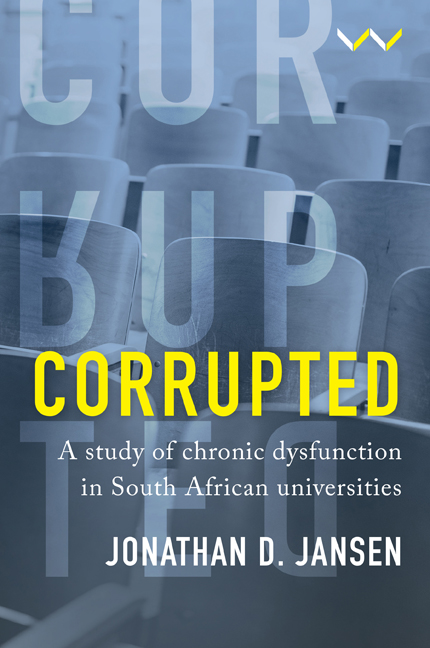Book contents
- Frontmatter
- Contents
- Acknowledgements
- Acronyms and Abbreviations
- Map: South African Universities
- Chapter 1 A Study of Chronic Dysfunction in Universities
- Chapter 2 Historical Roots of Dysfunction: Shaping the South African University
- Chapter 3 Dysfunctionality in Universities: A Political Economy Perspective
- Chapter 4 A Personal Journey Through the Political Economy of Universities
- Chapter 5 Casting Long Shadows: How History Shapes the Politics of Universities In South Africa
- Chapter 6 The University as a Concentrated and Exploitable Resource
- Chapter 7 The University as a Criminal Enterprise
- Chapter 8 The Micropolitics of Corruption in Universities
- Chapter 9 The Twin Roots of Chronic Dysfunctionality in Universities
- Chapter 10 Rethinking and Rebuilding Dysfunctional South African Universities
- Appendices
- Notes
- References
- Index
Chapter 4 - A Personal Journey Through the Political Economy of Universities
Published online by Cambridge University Press: 29 November 2023
- Frontmatter
- Contents
- Acknowledgements
- Acronyms and Abbreviations
- Map: South African Universities
- Chapter 1 A Study of Chronic Dysfunction in Universities
- Chapter 2 Historical Roots of Dysfunction: Shaping the South African University
- Chapter 3 Dysfunctionality in Universities: A Political Economy Perspective
- Chapter 4 A Personal Journey Through the Political Economy of Universities
- Chapter 5 Casting Long Shadows: How History Shapes the Politics of Universities In South Africa
- Chapter 6 The University as a Concentrated and Exploitable Resource
- Chapter 7 The University as a Criminal Enterprise
- Chapter 8 The Micropolitics of Corruption in Universities
- Chapter 9 The Twin Roots of Chronic Dysfunctionality in Universities
- Chapter 10 Rethinking and Rebuilding Dysfunctional South African Universities
- Appendices
- Notes
- References
- Index
Summary
he personal is political economy.
‘The Minister has instructed us to give you a bodyguard; the guard will come from the group that provided security to President Mandela.’ The announcement landed with a thud, made worse by the fact that someone thought a simple professor from the University of Pretoria needed to know the elite security stable from which his protection was to come. Why would the administrator of a troubled university need armed bodyguards?
My initial reaction was to resist. After all, I had grown up on the rough streets of the Cape Flats and had seen my fair share of ruthless gangsters; ‘I can handle this,’ I tried to reassure myself. But the minister's envoy made it clear that this was not something to be negotiated. I would have a bodyguard.
Late that night, as I finished work on the main campus of the Mangosuthu University of Technology (MUT) in the township of Umlazi, the armed guard was waiting outside my fortified office. I was tense on the short trip of about 18 kilometres to my hotel on the Durban beachfront. ‘Wait outside please,’ ordered the guard as he walked through my hotel room, checking cupboards and lifting lampshades. After a few minutes, I was allowed in and ordered to double-lock the door. I fell on the bed emotionally exhausted.
Then a strange realisation came to me as I reflected on the situation. This was wrong. As a scholar, I treasure the idea of a university as a place where one is free to think and to act in accordance with academic values. The notion of being accompanied by armed guards onto and off campus was inimical to the very idea of a university. I was disturbed about what this unwanted security detachment would signal to the community of students and academics whom I was expected to lead out of trouble. For the first time it hit me: this might not be a university after all, only an organisation in which staff came to earn a living and students came to obtain a certificate that might one day earn them a decent income. The routines of administration were certainly there – registration, instruction, examination, graduation – but the true essence of a university was not at all evident in those moments, and even less so as I entered the belly of the institutional beast.
- Type
- Chapter
- Information
- CorruptedA Study of Chronic Dysfunction in South African Universities, pp. 59 - 88Publisher: Wits University PressPrint publication year: 2023



